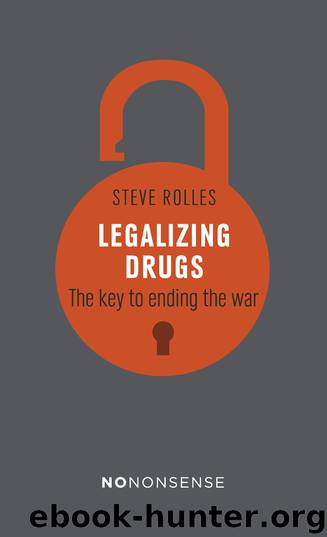NoNonsense Legalizing Drugs by Steve Rolles

Author:Steve Rolles
Language: eng
Format: epub
ISBN: 9781771133210
Publisher: Between the Lines
Published: 2017-03-18T04:00:00+00:00
Addressing key concerns around legalization and regulation
Risks of unintended negative consequences exist for any policy change, and, while experience with regulating other drugs can provide clear guidance, it is important to acknowledge that there is also a lot we do not know. But this is not a change that will happen overnight. Moves toward regulated drug markets would need to be phased in cautiously over a period of months and years, with close evaluation and monitoring of the impacts of any new model. Experimental policy models and pilot projects would be needed, and lessons from these – such as the pioneering cannabis-regulation models emerging around the world – could then inform the body of knowledge available for others as we move forward.
Over-commercialization and profit-led promotion of drug use
One key risk would be that drugs would be made available without adequate regulation and that there would be profit-motivated commercialization and aggressive marketing of newly legalized drugs. Clearly there are profound tensions between the interests of public health (to moderate risky drug use and minimize health harms), and the interests of commercial entities selling drugs (to maximize consumption, sales and profits). While legal corporations are preferable to organized crime groups in that they pay tax (or should do), and are answerable to the law, trade unions and consumer groups, they do also have the freedom and power to market and advertise their products directly to customers in ways that organized crime cannot. Important lessons need to be learned from the successes and failures of different approaches to alcohol and tobacco regulation – companies have to be constrained from seeking more profit by encouraging new consumers to try the products or existing consumers to buy more.
In practice this will entail establishing regulatory frameworks that can prevent the excesses of unregulated marketing of the kind that has proved such a public-health disaster with alcohol and tobacco in the past. We have, for example, grown used to alcohol product brands sponsoring sports teams and music events – aggressively exposing adults and children to positive associations between a risky drug and aspirational, glamorous and healthy lifestyles. The idea that legal drug brands in the future would sponsor sporting events would quite rightly be met with outrage. But remember that tobacco sponsorship of the Olympics continued until as recently as 1984, and alcohol-brand Olympic sponsorship continues today. Even high-speed car racing (with frequent crashes all part of the entertainment) is still routinely sponsored by alcohol brands, which is astonishing in the context of almost 270,000 alcohol-related road fatalities worldwide each year.2 Incorporating these lessons is likely to mean the sort of regulatory controls that are increasingly seen in tobacco control (and outlined in the WHO Framework Convention on Tobacco Control). These have effectively reduced tobacco consumption in many countries, without denying legal access to the market for businesses, or resorting to the criminalizing of users. Other models that could be considered include restricting the size of businesses allowed to participate in a market (to prevent corporate capture,
Download
This site does not store any files on its server. We only index and link to content provided by other sites. Please contact the content providers to delete copyright contents if any and email us, we'll remove relevant links or contents immediately.
| Anthropology | Archaeology |
| Philosophy | Politics & Government |
| Social Sciences | Sociology |
| Women's Studies |
Cecilia; Or, Memoirs of an Heiress — Volume 1 by Fanny Burney(32558)
The Great Music City by Andrea Baker(32020)
Cecilia; Or, Memoirs of an Heiress — Volume 2 by Fanny Burney(31956)
Cecilia; Or, Memoirs of an Heiress — Volume 3 by Fanny Burney(31942)
We're Going to Need More Wine by Gabrielle Union(19046)
All the Missing Girls by Megan Miranda(16031)
Pimp by Iceberg Slim(14508)
For the Love of Europe by Rick Steves(14123)
Bombshells: Glamour Girls of a Lifetime by Sullivan Steve(14077)
Talking to Strangers by Malcolm Gladwell(13371)
Norse Mythology by Gaiman Neil(13370)
Fifty Shades Freed by E L James(13243)
Mindhunter: Inside the FBI's Elite Serial Crime Unit by John E. Douglas & Mark Olshaker(9344)
Crazy Rich Asians by Kevin Kwan(9293)
The Lost Art of Listening by Michael P. Nichols(7506)
Enlightenment Now: The Case for Reason, Science, Humanism, and Progress by Steven Pinker(7314)
The Four Agreements by Don Miguel Ruiz(6765)
Bad Blood by John Carreyrou(6622)
Weapons of Math Destruction by Cathy O'Neil(6281)
